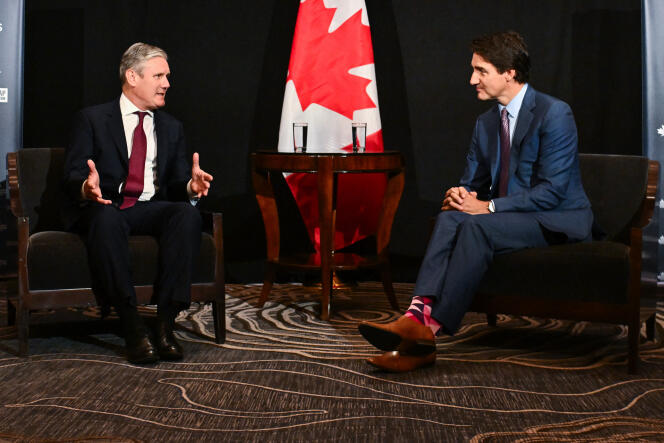


As proof that the campaign for the next British general election has begun in earnest, Keir Starmer, leader of Labour, the UK's largest opposition party, is taking to the international stage, which he has so far carefully avoided. On September 14, he was in The Hague for talks with representatives of the Europol anti-crime agency. He then flew to Montreal, Canada, where last weekend he took part in a conference of social democratic leaders. He bumped into Finland's Sanna Marin and Barack Obama and had a one-on-one meeting with Canadian Prime Minister Justin Trudeau. The 61-year-old former director of public prosecutions for England and Wales was scheduled to be in Paris on Tuesday, September 19, for a meeting with Emmanuel Macron.
Since taking over the Labour party in April 2020, the methodical and cautious Starmer has managed to neutralize the party's left and enjoys a lead of at least 15 points in the polls. He is also daring to tackle subjects hitherto deemed excessively risky by his strategists, as they were too divisive in British public opinion: migration and relations with the European Union (EU). Since Montreal, he has promised that if his party wins the election (which will probably take place in fall 2024), he will initiate a "major renegotiation" of the post-Brexit trade agreement signed, at the end of 2020, between Boris Johnson and representatives of the EU.
In an interview with the Financial Times, Keir Starmer insisted that "Almost everyone recognizes the deal Johnson struck is not a good deal – it's far too thin." He added, "We have to make it work (...) I say that as a dad. I've got a 15-year-old boy and a 12-year-old girl. I'm not going to let them grow up in a world where all I've got to say to them about their future is, it's going to be worse than it might otherwise have been." The economic impact of Brexit is difficult to quantify, but it is now accepted that it has complicated trade in goods and services with the EU due to the customs procedures put in place.
His plan remains vague: The MP has already mentioned a possible veterinary agreement to abolish cumbersome animal and plant health controls at borders, as well as reciprocal recognition of professional qualifications with the continent. But Starmer ruled out negotiating the United Kingdom's reintegration into the single market. The main question is whether the Europeans, after the European elections in 2024, will have the energy and political will to grant London more than the technical revision of the treaty, already scheduled for 2025.
You have 53.14% of this article left to read. The rest is for subscribers only.
